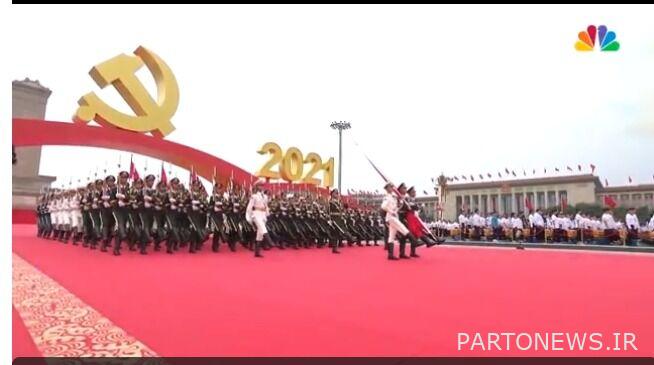20 years of alleged US war on terror, an opportunity for China to become a superpower

According to an IRNA report on Sunday from the NBC News website; Following the collision of a Chinese fighter jet with a US reconnaissance aircraft over Chinese coastal waters on April 1, 2001, the military aircraft was forced to make an emergency landing on Chinese soil and its crew was detained for 11 days. During this time, Chinese experts carefully examined the advanced aircraft before returning it. Washington has accused the Chinese fighter pilot of careless flight, and Beijing has apologized to Washington.
But the 9/11 attacks and the hijacking of four passenger planes by al-Qaeda operatives, three of which crashed into the twin buildings of the World Trade Center in New York and the Pentagon in Virginia, suddenly shifted Washington’s focus to The war on terror took place in the Middle East, US troops were sent to Afghanistan and the Middle East, and the Chinese challenge was abandoned for nearly 20 years.
According to Kishore Mahbubani, a former UN ambassador to Singapore, a prominent member of the National University and author of “Has China Won?”, These developments were an incredible geopolitical gift to Beijing, and Washington’s focus on the war on terror was a big mistake. Because the real challenge came from China. China’s GDP over the past 20 years, at a time when Washington was at war, but China was trading, from $ 1 trillion and $ 200 billion in 2000 to more than $ 14.7 trillion. It jumped in 2020.
According to experts, while the United States was engaged in fighting militants in Afghanistan, Iraq and other countries, China was increasing its economic and military strength at an incredible rate.
According to Craig Singleton, a researcher at the Foundation for the Defense of Democracies; Beijing quickly realized after 9/11 that Washington’s strategic focus had shifted 3,000 miles away from the East China Sea to the Straits of Taiwan and toward Afghanistan. This was an opportunity for Beijing to quietly build very strong military capabilities aimed at expanding Chinese power in East Asia.
According to James Lewis, a senior fellow at the Center for Strategic and International Studies; The 9/11 attacks did not change Beijing’s goals, but they did provide an opportunity to bridge the gap with a rival whose focus had shifted from the battlefield to the war on terror. Washington officials at the time thought they could postpone the not-so-important Chinese problem to the future at the same time as establishing democracy in Iraq and Afghanistan.
According to Brown University War Project Cost Report; The United States has spent nearly $ 8 trillion fighting terrorism in Afghanistan, Iraq and elsewhere.
According to Lewis, the money could be spent over the next 20 years on researching, developing, modernizing and modernizing US infrastructure and building high-tech weapons. As Beijing raises defense spending to build anti-ship missiles in the western Pacific and expands its naval fleet, the Pentagon prepares the US military to fight insurgents and Kalashnikov-armed militias in the Middle East. And the US Air Force gradually became accustomed to operating in skies with complete superiority.
The administration of then-President George W. Bush changed its approach to Beijing in the wake of the 9/11 attacks, eased its human rights pressures, and forced Taiwan to cancel its referendum on independence from China. He won support in the UN Security Council to fight al-Qaeda. Even in 2020, at the request of Beijing, Washington declared the Islamic Movement of East Turkmenistan, an anonymous organization of the Uyghur minority, a terrorist group. According to experts, Washington’s decision and the exaggerations and slogans about the fight against terrorism justified the repression of the Uyghurs.
Although Barack Obama entered the White House in 2009, his administration officials spoke of the need to shift the focus to Asia and focus more on confronting China, but aimless war operations in Afghanistan and tensions in the Middle East have led to further deviations. Washington’s focus shifted from Beijing.
“For years, US political and business leaders did not see China’s economic and trade policies as a major problem,” said Obama, a senior adviser to the Asia-Pacific region.
According to Mastrow, a senior member of the American Enterprise Institute, while it is quite true that China was able to win by diverting US attention to the rest of the world, one should not assume that Washington would have won the race if 9/11 had not happened. Was.
Now that China is deliberately at the forefront of Washington’s agenda, both major US parties agree on the need to tighten Beijing. President Joe Biden has maintained tariffs on his predecessor, Donald Trump, and US Congress and companies are calling for action to boost the country’s microchip industry, invest and research in it, and protect US technology from industrial espionage.
According to some experts, despite the loss of valuable time, the United States still does not have a long-term strategy on how to deal with China, and there is a risk that Washington will deviate from its main task due to Beijing’s polar policies.
According to Lewis; The Soviet Union in the 1970s, following the humiliating defeat and retreat of the United States from Vietnam at a time of economic hardship and rising oil prices, thought the United States was falling. Even now, Beijing often sees the United States as a collapsing power whose collapse is inevitable.
Lewis says he has told his Chinese counterparts in private that it is not yet time to ignore the United States, as there is still time for the Soviet Union to imagine the US disappearing.
.

